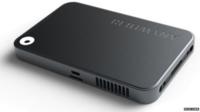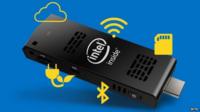

-
4 June 2015
- From the section Technology

A Taiwanese company has created a plug-like computer capable of running Microsoft’s forthcoming Windows 10 operating system.
Quanta’s Compute Plug is designed to be pushed directly into a power socket, has an HDMI port for TV connections and two USB sockets.
It is not the first such device. US chipmaker Marvell has promoted a range of similarly formed PCs since 2009.
But they are designed to work with the less processor-intensive Ubuntu OS.
To date, Marvell’s “plug computers” ecosystem – which is targeted at schools and smart home enthusiasts – has had only niche appeal.
Fingerprint PC
Microsoft announced details about the new wi-fi enabled Windows device on its blog, indicating that it was designed to be cable-linked to a screen to turn it into a voice-controlled portable computer.
“The new Compute plug from Quanta is a mini PC and power adapter in one that can be plugged into any outlet and connected to a TV to turn it into a smart computer that can be controlled using Cortana via a Bluetooth remote or headset,” it said.
The software-maker also showed off another unusual device made by Foxconn – a Taiwanese company which is best known for assembling other company’s products.

The Kangaroo fits a Windows 10-powered PC into a box that resembles a portable hard disk drive fitted with a fingerprint reader on top. It also features a battery said to be capable of lasting six hours between charges.
Microsoft describes it as an “ultra-portable” computer that “can turn a TV into a full Windows 10 PC”.
The US firm was unable to provide pricing or launch dates for the equipment, which it announced to coincide with the Computex trade show.
That casts a question mark over how widely they will be offered for sale.
But one analyst suggested they were a taste of things to come.
“Foxconn, Microsoft and Quanta aren’t boasting about computing power with these devices – that’s not the point,” commented Peter Bryer from the consultancy CCS Insight.
“It’s a matter of utility, enabling users to have specialised PCs scattered throughout the house.
“Windows 10 supports a wider set of devices, providing Microsoft with the flexibility to compete against more new shapes and sizes.”
‘Luggables to pluggables’
The new Windows OS is released as a completed build on 29 July, and will be free to existing Windows users and $119 (£78) to others for the basic version.
Based on the evidence of preview versions made available to for the public to test, some experts have suggested it might be a “buggy” experience, at least at first.

But those wishing to try out a tiny computer can already do so with other products already on the market.
Intel released its Compute Stick in April – an HDMI dongle that turns TVs into computers, which has both a USB port and an in-built MicroSD card reader.
It is sold pre-installed with a choice of either Windows 8.1 or Ubuntu.
Reviews, however, have complained that is is under-powered and “feels more like a proof-of-concept than a consumer device”.

Elsewhere, China’s RikoMagic offers the fifth generation of its Mini PC, which now supports 4K-resolution video playback, and comes with either Android or Ubuntu.
And on the horizon, Asus is set to release the Chromebit – a dongle powered by Google’s Chrome OS.
That device is due to go on sale for under $100 (£65) before the end of August.

“Defining the classes of products will be an ongoing challenge,” commented Mr Bryer.
“However, we hope to see more fresh designs.
“The market for computers has gone from luggables to pluggables in short order.”

